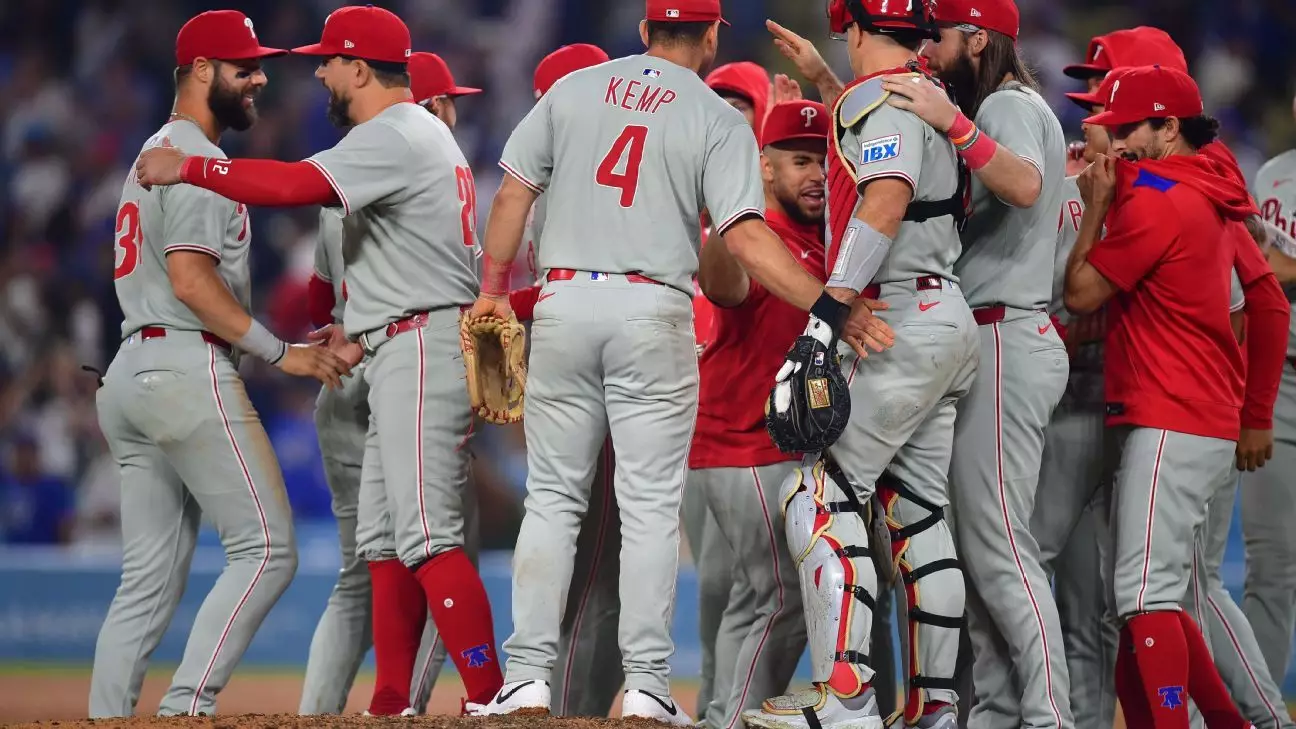The Philadelphia Phillies’ recent clinching of the NL East title marks a pivotal moment not just for the franchise but also for those who believe in persistence amid challenges. While celebrations like pouring Champagne and chugging beer from unconventional sources might seem superficial, they symbolize a deeper truth: resilience. Despite losing their ace pitcher Zack Wheeler and dealing with injuries to key players like Trea Turner and Alec Bohm, the Phillies surged forward, defying expectations and demonstrating that grit often outweighs talent alone.
This victory is more than just a spot in the postseason; it’s a testament to mental toughness and strategic adaptability. In a sport where momentum can shift rapidly, the Phillies’ ability to rally after blowing multiple one-run leads emphasizes a culture rooted in tenacity. They fought through fatigue, injuries, and the pressure of a tight race, illustrating that perseverance and unity can propel a team beyond its perceived limitations. This moment should inspire fans and critics alike to reconsider what success truly entails—it’s not solely about talent, but the collective will to keep fighting, even when the odds seem stacked against you.
The Power of Leadership and Strategic Flexibility
Manager Rob Thomson’s leadership deserves particular scrutiny. His ability to navigate through a tumultuous season marked by injuries and mid-season roster changes reflects a strategic mind attuned to the nuances of high-stakes baseball. His acknowledgment of the team’s “balance” between slugging and small-ball tactics reveals adaptability—an essential trait in modern baseball, where specialization and versatility often determine postseason success.
Thomson’s accomplishment of securing consecutive division titles, a feat achieved previously only by managerial giants, highlights an organizational maturity that centers around resilient leadership. While some might dismiss managerial influence as secondary to raw talent, this season’s success underscores that tactical acumen and morale-building can be game-changers. As the Phillies continue their playoff push, it becomes increasingly clear that leadership rooted in adaptability and motivational strength is a critical component of sustained success—something not always appreciated in the traditionally individualistic narrative of baseball.
The Significance of Resilience in a Changing Baseball Landscape
The Phillies’ story is emblematic of a broader shift in baseball culture—one that values adaptability, mental toughness, and a pragmatic approach over reliance on star power alone. Their ability to perform without Zack Wheeler for much of the season, to rally behind clutch homers by Weston Wilson and Bryce Harper, and to maintain composure under pressure signals an evolution in team dynamics. It proves that resilience, when cultivated intentionally, becomes a strategic advantage, especially in the face of unpredictable injuries or setbacks.
In a sport obsessed with stats, milestones, and individual performances, the Phillies’ resilience reinforces the importance of collective effort. Their victory is not solely about surpassing the Dodgers or securing a division title; it’s about showcasing that a team can redefine success when it refuses to succumb to adversity. This perspective should inspire a more liberal, inclusive view of achievement—highlighting collaboration over individual heroism and persistence over complacency.
The Broader Implication for the Future of Baseball and Society
What does the Phillies’ triumph mean beyond the baseball diamond? It signals a cultural shift—a move towards recognizing that perseverance, strategic flexibility, and collective effort matter most in competitive environments. This resonates strongly with center-wing liberal ideals, emphasizing social cooperation, resilience, and the importance of communal support systems.
This season’s narrative challenges the illusion that success is predetermined by talent alone. Instead, it champions adaptability and determination—qualities that are vital not only in sports but across societal spheres. The Phillies’ story encourages us to rethink our approach to challenges, advocating for policies and leadership styles that foster resilience and unity. It reveals that even in the face of setbacks and uncertainties, progress is achievable when individuals and organizations rally together with unwavering resolve. Their victory underscores that, whether on the baseball field or in the broader societal context, perseverance and strategic endurance are the true catalysts for lasting success.


Leave a Reply